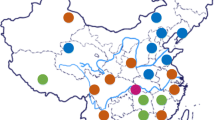Abstract
Guaranteeing of quality-of-service (QoS) is a challenging task to promote the evolution of the Internet from a simple data network into a true multiservice network. To this end, the IETF intserv Working Group, with the goal of defining a next generation Internet, has defined two QoS classes: Guaranteed Services and Controlled-Load Services. For both of them the source is required to declare its traffic characteristics by means of a number of Tspec parameters and guarantee these traffic characteristics during transmission. The target of this paper is to develop an analytical tool for the design of feedback laws which allow MPEG encoders to inject into the network video traffic shaped according to the declared Tspec, while maintaining an acceptable perceived quality.
Access this chapter
Tax calculation will be finalised at checkout
Purchases are for personal use only
Preview
Unable to display preview. Download preview PDF.
Similar content being viewed by others
References
Coded Representation of Picture and Audio Information, International Standard ISO-IEC/JTC1/Sc29/WG11, MPEG Test Model 2, July 1992.
A. Puri, R. Aravind, “Motion-compensated video coding with adaptive perceptual quantization,” IEEE Transactions on Circuits and Systems for Video Technology, vol. 1, no. 4, December 1991.
W. Luo, M. El Zarki, “Quality Control for VBR Video over ATM Networks,” IEEE Journal on Selected Areas in Communications, vol. 15, no. 6, August 1997.
M. Hamdi, J. W. Roberts, P. Rolin, “Rate control for VBR video coders in broadband networks,” IEEE Journal on Selected Areas in Communications, vol. 15, no. 6, August 1997.
Paul P. White, “RSVP and Integrated Services in the Internet: a Tutorial,” IEEE Communications Magazine, Vol. 35, No. 5, May 1997.
O. Hashida, Y. Takahashi, and S. Shimogawa, “Switched Batch Bernoulli Process (SBBP) and the discrete-time SBBP/G/1 queue with application to statistical multiplexer,” IEEE Journal on Selected Areas in Communications, vol. 9, no. 3, April 1991.
A. Lombardo, G. Morabito, G. Schembra, “An Accurate and Treatable Markov Model of MPEG-Video Traffic,” Proc. IEEE Infocom.98, San Francisco, USA, April 1998.
A. La Corte, A. Lombardo, G. Schembra, “An Analytical Paradigm to Calculate Multiplexer Performance in an ATM Multimedia Environment,” Computer Networks and ISDN Systems, vol. 29, no. 16, December 1997.
S.-qi Li, S. Park, D. Arifler, “SMAQ: A Measurement-Based Tool for Traffic Modeling and Queuing Analysis Part I: Design Methodologies and Software Architecture,” IEEE Communications Magazine, vol. 36, no. 8, August 1998.
J. J. Bae, T. Suda, R. Simha: “Analysis of Individual packet Loss in a Finite Buffer Queue with Heterogeneous Markov Modulated Arrival Processes: A study of Traffic Burstiness and a Priority packet Discarding,” Proc. IEEE INFOCOM.92, Florence, Italy, May 1992.
T. Takine, T. Suda, T. Hasegawa, “Cell Loss and Output Process Analyses of a Finite-Buffer Discrete-Time ATM Queueing System with Correlated Arrivals,” Proc. IEEE INFOCOM.93, San Francisco, CA, March 1993.
A. E. Kamal, “Efficient Solution of Multiple Server Queues with Application to the Modeling of ATM Concentrators,” Proc. IEEE INFOCOM.96, San Francisco, CA, March 1996.
M. F. Neutz, “Matrix-Geometric Solutions in Stochastic Models: an Algorithmic Approach,” Johns Hopkins University Press, Baltimore, MD, USA, 1981.
Author information
Authors and Affiliations
Editor information
Editors and Affiliations
Rights and permissions
Copyright information
© 2001 Springer-Verlag Berlin Heidelberg
About this paper
Cite this paper
Cocimano, F., Lombardo, A., Schembra, G. (2001). A Markov Model for the Design of Feedback Techniques to Match Traffic Specification Parameters in MPEG Video Sources. In: Marsan, M.A., Bianco, A. (eds) Quality of Service in Multiservice IP Networks. QoS-IP 2001. Lecture Notes in Computer Science, vol 1989. Springer, Berlin, Heidelberg. https://doi.org/10.1007/3-540-44554-4_11
Download citation
DOI: https://doi.org/10.1007/3-540-44554-4_11
Published:
Publisher Name: Springer, Berlin, Heidelberg
Print ISBN: 978-3-540-41512-1
Online ISBN: 978-3-540-44554-8
eBook Packages: Springer Book Archive




